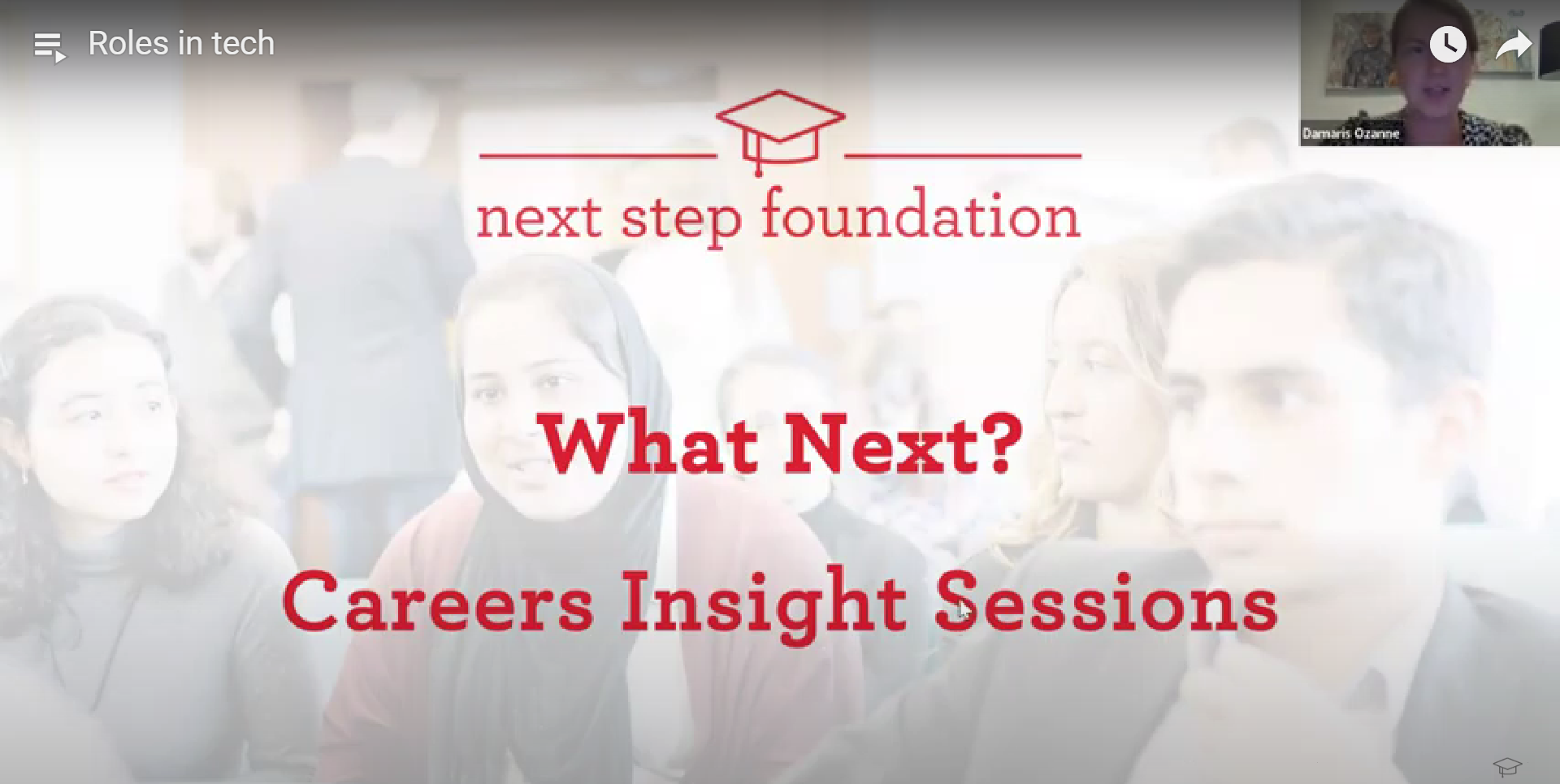What Next? Careers Insight Sessions
How on earth do know what you want to do when you leave university? Where do you even begin?
One way of figuring out the answer to this important and challenging question is to meet professionals from a wide variety of industries and talk to them about what they do. We wanted to give our students the chance to do just that.
So, from 6th to 14th July 2022, we hosted seven online careers panel discussions. These sessions took place live in an informal setting. Students were able to quiz our panellists with their careers-related questions.
Our panellists came from all sorts of backgrounds with a vast array of work experience in fields such as tech, law, finance, the arts, business, politics, and scientific research. They explained how they had progressed towards their current line of work; taking us all the way through school and university studies, they discussed how their interests and other factors had an impact on career decisions and brought them to where they are today.

Here are some thoughts and observations that really hit home:
“Don’t do something you feel you should be doing. Don’t do something that makes you seem grown up. Do something that makes you happy. That’s the most important thing. Your career is yours, nobody else’s.” Olivia Bright, Curator, Daata
“My one pro tip would be: often you’ll see a job spec that has many things in the minimum requirements. I used to think that I needed to hit 8 or 9 out of ten of these requirements to apply, but actually it turns out that if you’re motivated, interested, have transferable skills and are able to work in ambiguity and thrive in that environment, you don’t need to hit all of those points or self-select yourself out of applying. You can be just as credible a candidate as someone who does have direct industry experience.“ Feng Cai, Product Counsel, Google
“You learn so much more from talking to people than looking at websites. People generally like to talk about themselves! Then you can move into trying to get work experience so you’re well informed when you come to apply for jobs.” Richard Roberts, Barrister
“Consider applying to Oxford and Cambridge, there’s no harm in going for it! I really enjoyed the interview process. Don’t get too frustrated if you don’t always get what you think is your first choice because the other options may work out better.” Tom Dalton, Clinical Data Analyst, 33N Limited
“It’s really fun exploring careers and thinking what you could be good at. Increasingly we’re having not such vertical careers but more horizontal careers where you can try out lots of different things.” Jenny Roberts Senior Manager, Bain and Company
“I think what attracts people to medicine is probably the most important thing: you have an interest in sciences, you like working with people, either helping people or working as part of a big team, and you’re interested in a career that has many avenues and is constantly evolving – then medicine is definitely the thing for you. Go in with this warning that it’s going to be hard work! But you will be rewarded. Don’t worry too much about the end result – enjoy the journey and where it takes you.” Tristan McMillan, National Spine Fellow, Leeds Teaching Hospitals Trust
“Keep researching and looking into what’s available because there are so many areas within law that you can get involved in. If you can, send emails to people and ask (politely) if they have ten minutes to meet over a coffee.” Clara Hughes, Associate Patent Attorney
“Lots of firms have scholarships and internships, you should be assessing where you might like to work and finding out when applications for these opportunities open. Also see if you can connect with anyone who has done these internships before so you can ask them about their experience. Build relationships with professors at university because then they’ll think about you when they here of new opportunities.” Temi Soleye, Global Head, Culture and Learning
“There are some free publications you can read that could be worth following – this gives you the opportunity to track what’s going on; you can contact the authors of these articles and get a feel for what you might enjoy within STEM.” Emily Urry, Digital Health Innovation
With sincere thanks to our panellists:
Jennifer Appleton-Huber, Scientific Audiology Manager, Phonak Headquarters
Olivia Bright, Curator, Daata
Feng Cai, Product Counsel, Google
Tom Dalton, Clinical Data Analyst, 33N Limited
Stuart Douglas, Director, Industry Solutions
Harry Foot, Senior Associate, Strategic Finance APAC at Uber
Francis Gardiner, Identity and Access Management Lead in Cyber Security, Starling Bank
Clara Hughes, Associate Patent Attorney, Carpmaels & Ransford
Louis Jamieson CFA, Global Equity Analyst, Sanlam Investments
Calum Jeffray, Civil Servant, UK Government
Megan Manners, European Design Lead
Tristan McMillan, National Spine Fellow, Leeds Teaching Hospitals Trust
Richard Morris, Automotive and Banking Consultant
Fergus Mutch SNP, Scottish Government
Jenny Roberts, Senior Manager, Bain and Company
Richard Roberts, Barrister
Temi Soleye, Global Head in Culture & Learning, Palantir Technologies
Charlotte Turnbull, SHO, Hammersmith Hospital
Emily Urry, Digital Health Innovation, Sonova AG
Chloe Wootton, Head of Policy, Civil Service


